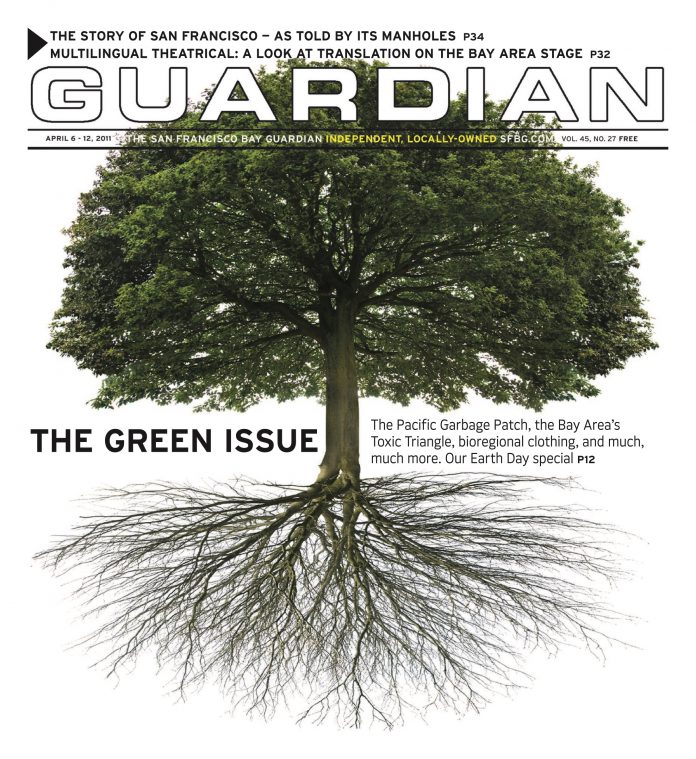steve@sfbg.com
As the homegrown Burning Man festival and culture marks its 25th anniversary, Black Rock City LLC, the company that stages the annual event, is about to take a couple of big steps. Next month, organizers say it will move into a high-profile new headquarters on mid-Market Street and form a new nonprofit group to take over Burning Man.
Tickets to the weeklong festival, which takes place Aug. 28-Sept. 5 in Nevada’s Black Rock Desert, have been selling at their fastest pace ever and the city is likely to exceed a population of 50,000. Symbolizing perhaps the biggest transitional year since 1996, when the LLC was formed and a more formal civic infrastructure was created, the eponymous Man will be in a new pose for the first time: striding across a chasm rather than standing still.
While the transitions have been in the works for years, event founder Larry Harvey publicly laid out the details for the first time on April 1, when he addressed a gathering of Burning Man regional representatives from around the world.
“I’m here tonight to talk to you about the next step for Burning Man,” Harvey told the crowd of about 150 regional representatives and another couple hundred burners, including Sup. Eric Mar, who attended the event last year for the first time. Sup. Jane Kim, who is sponsoring a controversial mid-Market tax exclusion zone that would benefit BRC and many other companies (see “Selling the Tenderloin,” March 30), appeared at the event briefly but didn’t stay for the whole speech.
Harvey then proceeded to talk for more than an hour, revealing often personal details about the bitter infighting among BRC’s six board members that followed lawsuits filed in 2006 by board member Michael Mikel and in early 2007 by John Law, an estranged founder of the modern event, over control of Burning Man’s trademarks and future (see “Burning Brand,” 1/6/07).
“It triggered a series of cascading events, and those began a rite of passage,” Harvey said, echoing this year’s Burning Man art theme, Rites of Passage.
With Mikel and Law forcing the question of what would become of the event, BRC realized it needed a new operating agreement, but the board members couldn’t agree on the fundamentals and ended up in mediation. “It began to look like everybody would lawyer up,” Harvey said. “It felt like the band was breaking up.”
They brought in corporate appraisers to “think about what the pie will fetch, then divide by six,” an idea that was as abhorrent to Harvey as it would certainly have been to the vast community of burners who have helped give the event its value over decades now.
“It was against everything we stood for, everything we had practiced,” he said. “How could we sell our life’s work like a commodity?”
Eventually, working with a committee of BRC senior employees that formed after relations on the board devolved, they decided to turn control of the event and its assets over to a new nonprofit group called The Burning Man Project.
“Why not act to change the world, a world that you won’t be in? And that’s what we want to do,” Harvey said, eliciting applause from the room. “We want to get out of running Burning Man. We want to move on.”
But it’s going to be a slow process. In May, he said the LLC will file papers to create the nonprofit, which will initially be run by the current board members and at least seven more directors selected by that board. In about three years, depending on how the new nonprofit forms up, the LLC will turn over management of Burning Man, while holding onto control of the logos and trademarks for another three years after that, Harvey said. And that’s when the six board members will officially cash out.
“We will liquidate our ownership interests and it will be for more than $20,000,” Harvey said, alluding to the sum promised to departing board member under the LLC’s original operating agreement, an amount he dismissed as “laughable.”
The slow, conditional transition and big potential payout were criticized by longtime burner and former mayoral candidate Chicken John Rinaldi, who led a 2004 rebellion against the board’s control over an event that is created mostly by its participants.
“We’ve gotta pay for their retirement for something they stole from us in the first place?” Rinaldi said. “They’re turning Burning Man into a commodity. They’re selling the event.”
Harvey, Mikel, and board member Marian Goodell say they are simply trying to safeguard Burning Man and ensure its longevity. “Nonprofits can go bad so the real challenge is creating a rugged framework,” Mikel said. “This thing needs to run beyond us.”
But even Rinaldi agreed with the move to Mid-Market, which Goodell said is good timing as BRC begins to create and shape the Burning Man Project. “We need to be in an urban environment to get a handle on what we need,” she said, noting how isolated their last two offices along Third Street have been. “We want to have a public face to the world.”
Guardian City Editor Steven T. Jones is the author of The Tribes of Burning Man: How an Experimental City in the Desert is Shaping the New American Counterculture.

